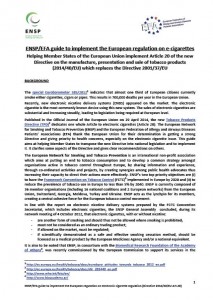October was busy in Europe! The new European Commission was approved by the European Parliament, the discussion on the Clean Air Package is getting more intense, the European Medicines Agency improved the database on reporting adverse drug reactions, and EFA together with European Network for Smoking and Tobacco prevention published a guide on e-cigarettes addressed to the EU Member States.
The European Commission 2014-2019 is confirmed!
On October 22nd the European Parliament approved the new College of Commissioners proposed by the European Commission President-Elect Jean-Claude Junker, with 423 votes in favour, 209 against and 67 abstentions. The new Commission still requires the approval of Member States through the European Council, but it is unlikely that other changes will take place.  MEPs document the new European Commission's approval.[/caption] Just before opening the final debate, Jean-Claude Junker announced a slight but extremely important reshuffle of his proposed Commission’s portfolios that reflected concerns raised by the public health community and Members of the European Parliament. Specifically, Mr. Junker proposed health technology and pharmaceutical policies to be moved from the Health and Food Safety Commissioner Vytenis Andriukaitis towards the Industry and Internal Market Commissioner Elżbieta Bieńkowska. Such u-turn in health policies provoked great concerns and dissatisfaction at European level, and EFA joined the public health community public statement in Europe. We believe that medicines and pharmaceutical cannot be considered as any other internal market goods. The joint voice of health activists and patients was heard, and we are happy to announce that President-Elect Junker left medical devices and pharmaceuticals under the responsibility of the Health Commissioner, as they have been under the present Commission. In addition to that, Mr. Junker confirmed that medicines are not solely an instrument for promoting economic growth, but a crucial element for building safe and sustainable health systems in Europe. Furthermore, in his response, he declared that he “will make sure that public health will be at least as important in our policies as internal market considerations”. EFA together with other stakeholders welcomes the decision of Mr Junker. The new Commission will start its work from the 1st of November, 2014 with the following structural public-health related changes:
MEPs document the new European Commission's approval.[/caption] Just before opening the final debate, Jean-Claude Junker announced a slight but extremely important reshuffle of his proposed Commission’s portfolios that reflected concerns raised by the public health community and Members of the European Parliament. Specifically, Mr. Junker proposed health technology and pharmaceutical policies to be moved from the Health and Food Safety Commissioner Vytenis Andriukaitis towards the Industry and Internal Market Commissioner Elżbieta Bieńkowska. Such u-turn in health policies provoked great concerns and dissatisfaction at European level, and EFA joined the public health community public statement in Europe. We believe that medicines and pharmaceutical cannot be considered as any other internal market goods. The joint voice of health activists and patients was heard, and we are happy to announce that President-Elect Junker left medical devices and pharmaceuticals under the responsibility of the Health Commissioner, as they have been under the present Commission. In addition to that, Mr. Junker confirmed that medicines are not solely an instrument for promoting economic growth, but a crucial element for building safe and sustainable health systems in Europe. Furthermore, in his response, he declared that he “will make sure that public health will be at least as important in our policies as internal market considerations”. EFA together with other stakeholders welcomes the decision of Mr Junker. The new Commission will start its work from the 1st of November, 2014 with the following structural public-health related changes:
- Consumer portfolio was moved from Directorate-General responsible for Health and Food Safety (DG SANCO) to the Commissioner responsible for Justice, Consumers and Gender Equality Věra Jourová;
- Cosmetics have been moved to the Internal Market and Industry Commissioner from the DG SANCO;
- DG SANCO has received new portfolios from DG Environment: biocides and food waste.
The Health Commissioner Vytenis Andriukaitis is planning to focus on the following issues: - preventive healthcare (PPP: prevention, promotion, protection), improvement healthcare systems through eHealth solutions; - development of solid anti-corruption package for healthcare systems; - follow-up on the implementation of the Cross-Border Health Directive; - review the decision-making process for GMOs within the first 6 months of his mandate. We wish to all new Commissioners a good start with their new mandate!
Clean air package for Europe: worrying developments on the NEC Directive
Back in 2013, the European Commission proposed its Clean Air Package, that included a directive on the reduction of national emissions of certain pollutants. As it is, the directive sets post-2020 national emission ceilings (NEC) for six air pollutants including particulate matter (PM) and nitrogen oxide (NOx). Despite the fact that overall ambition levels in the NEC proposals are already quite low (the proposed standards are not even closed to the recommendations developed by the World Health Organisation on clean air), under certain conditions Member States might be granted even more flexibility in the implementation of the NEC Directive based on the new study commissioned by the Directorate-General for Environment of the European Commission. For example, it would be possible for Member States to compensate excessive emissions of one pollutant by greater emissions reductions for another pollutant in any sector. Such mechanism would work according to the measurements on equivalencies between pollutants and on the basis of their contribution to mortality rates. According to the study, 1 tonne of PM2.5 emissions causes, on average, the same premature mortality as 3.36 tonnes of sulfur dioxide (SO2), or 14.9 tonnes of NOx. Thus, excessive emissions of 1 tonne of PM2.5 could be compensated by extra emission reductions of 14.9 tonnes of NOx. Deviations from emission ceilings for each pollutant could be limited by 10%, for instance. The proposed mechanism encountered the concerns of the European Environmental Bureau and other NGOs including EFA. Such mechanism would not only create a significant burden for the Commission due to all the required calculations on substituted emissions, but it could also lead to the weakening of already quite low targets: Member States would be allowed to reduce their efforts in controlling emissions of some pollutants, as long as they can go beyond the reductions required for others. Since the beginning of autumn 2014, the new European Parliament is analising the Clean Air Package and EFA will closely monitor all the developments within this package that is crucial for all allergy, asthma and COPD patients.
European database of suspected adverse drug reactions reports
The European Medicines Agency (EMA) has expanded the remit of its “adverse event reporting website” – allowing patients, the public and healthcare professionals to report suspected side effects on any nationally-authorised medicine. The move allows any problems to be reported through www.adrreports.eu. In addition to filing reports on suspected problems with medicines, the site also allows visitors to obtain information on suspected adverse drug reactions (those that have been reported but may not be related to, or caused by, the medicine). From EFA we welcome this initiative as broadening the opportunities for patients to report on reactions is key to improve treatments or, in EMA’s words, “Spontaneous reports of suspected side effects provide regulatory authorities with important information which is used to monitor the safety of a medicine.”
ENSP/EFA guide to implement the European regulation on e-cigarettes
Earlier this year, the European Union adopted the new directive on the manufacture, presentation and sale of tobacco products (2014/40/EU). Article 20 of this directive regulates electronic cigarettes in the European Union, but Member States are let free to decide some aspects of this regulation. As they have to transpose the directive in their national legislations by 2016 at the latest, EFA and the European Network for Smoking and Tobacco Prevention (ENSP) have developed a guideline for members to advocate at the national level for public health-friendly and patients-centred recommendations on electronic cigarette at. In particular, EFA and ENSP propose to regulate both electronic cigarettes with and without nicotine. Member States should avoid the renormalisation of tobacco use by going beyond the requirements set by the directive and implementing stricter policies on e-cigarettes, such as:
- ban advertising e-cigarettes not only when there is a cross-border effect;
- ban use of e-cigarettes in all public places where smoking is not allowed;
- strictly regulate flavours to limit vaping among children and young people;
- regulate e-cigarettes prices through taxation and World Health Organisation (WHO) Framework Convention Tobacco Control protocol on illicit trade in tobacco products.
The detailed ENSP/EFA recommendations on e-cigarettes regulation can be found here.